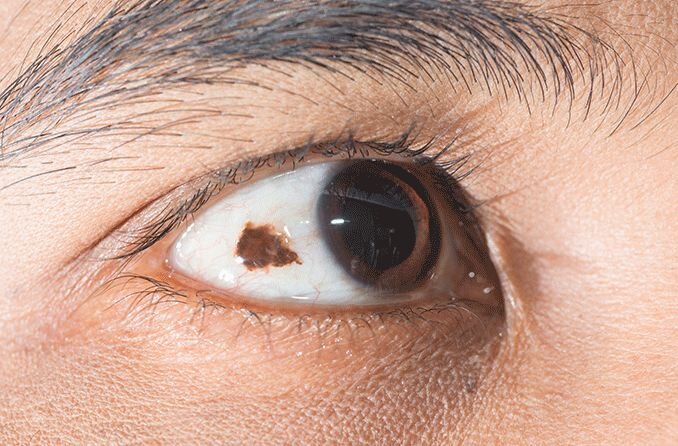An ordinary, colourful growth on or in your eye is known as a nevus. It resembles a mole on your skin and is occasionally referred to as an eye freckle. A nevus (plural: nevi) can be found under the retina in the rear of the eye, around the iris, or in the front of the eye.
Melanocytes are the type of cells that make up nevi. Melanin, the pigment responsible for our hair, skin, and eye hues, is produced by these cells. Melanocytes are typically uniformly distributed throughout human tissue. These cells can, however, clump together occasionally to produce nevi.
People may be born with a harmless eye nevus. Even though a pigmented area that appears later in life is mostly harmless, it may be more likely to develop into cancer.
Similar to a skin mole, an eye nevus needs to be monitored by an ophthalmologist on a frequent basis because it might turn into eye cancer.
Exposure to ultraviolet (UV) light may be linked to the emergence of nevi. It is usually advised to use sunglasses that protect your eyes from UV rays.
On the outside of the eye, nevi or eye freckles come in the following varieties:
A conjunctival nevus is a freckle- or mole-like growth on the conjunctiva, the transparent layer that covers your eye. This kind of nevus is extremely typical. It can gradually get lighter or darker and ranges in colour from yellow to brown. Typically, it is not malignant. Your ophthalmologist will monitor it over time, and if it becomes larger, they might examine it to see if it develops into a melanoma (a type of cancer).
Small, dark brown flecks called iris freckles can be seen on the coloured area of the eye (iris). They develop as the pigment melanin builds up, just like freckles on the skin. They are harmless and usually do not turn into melanoma.
Iris nevi, which are black spots on the colourful iris, resemble iris freckles. Iris nevi, on the other hand, are larger than iris freckles and descend into the stroma, a layer of the iris. The iris nevi get larger with time. These nevi, like iris freckles, are mostly benign (not cancerous). But an ophthalmologist will keep an eye on them over time to see if anything changes.
Iris freckles and nevi can both be seen with the unaided eye, but an ophthalmologist will perform an eye exam to identify which type you have.
A nevus may be discovered during a normal eye exam by your ophthalmologist. Your ophthalmologist may occasionally employ imaging tools like OCT to examine nevi more precisely, including choroidal nevi.
The nevus will be captured on camera by the ophthalmologist. To determine if there have been any changes in size or shape, they will compare images taken over time.
In six months, your ophthalmologist might advise you to have the nevus checked again. It is unlikely to be a melanoma if the nevus does not alter over the course of a year or two. However, as you age, nevi can transform into melanoma, therefore you should have it evaluated by an ophthalmologist on a frequent basis. Be sure to adhere to the schedule of exams that your ophthalmologist provides.
Most nevi do not need to be treated since they will not affect your vision or lead to any health problems only if your doctor thinks it might be melanoma then you will need treatment for a nevus.
In extremely rare circumstances, surgery may be used to remove an eye nevus that impairs the appearance of the eye.
A harmless nevus inside your eye will not be removed by your ophthalmologist because doing so could hurt your eye. The only time your doctor will advise therapy is if a nevus develops into cancer. Radiation, surgery, laser therapy, or eye removal are all possible forms of treatment. Sometimes, waiting and watching the nevus closely is a treatment option. This is recommended when the side effects of cancer treatment can be more problematic than helpful.
At The Eye Center- Dr. Mahnaz Naveed Shah & Associates our team of eight ophthalmology subspecialists/ eye specialists, eye surgeons who are considered amongst the very best eye specialists in Karachi and in Pakistan, have the diagnostic and treatment capabilities to treat from the simplest to the most complex patients. We work hard to provide our patients with the best possible medical and surgical eye care, in a state of the art purpose built eye care facility. We offer the entire array of medical, laser and surgical treatments to help provide patients the best possible care in the most efficient, safe and ethical manner.
If you need an appointment, please contact us at 03041119544 during our working hours or leave us a WhatsApp message at +923028291799 and someone will connect with you. Walk-in appointments are also available for emergencies. We can also be reached through our web portal on www.surgicaleyecenter.org


